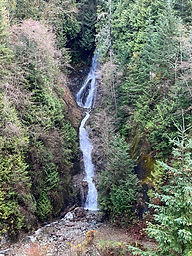Emergency Services Top of Mind
- kc dyer

- Jul 12, 2025
- 3 min read
Metro considers pooling resources of smaller communities

The topic of emergency services was top of agenda for the Electoral Area and Small Communities Committee Meeting on July 10. On Wednesday, Metro Vancouver staff presented a report (found on page 7 of the agenda HERE) on how the region can help small communities share emergency management services.
The report was in response to a request that arose at a meeting in February, when a number of members of the committee asked for a formalization of the support offered by Metro to smaller communities during an emergency.
The report notes that traditionally, the provision of emergency services falls to local government, but says a number of small communities with limited resources have expressed interest in working together.
In addition to city-wide services, Metro Vancouver provides emergency management services for Electoral Area A, which is the designation given to all the unincorporated area within the regional district. This includes the area above Lions Bay where the Battani Creek landslide took place last December.
According to the report, this includes:
Emergency planning through all four phases of emergency management (mitigation, preparation, response, recovery).
Incident command and response coordination at the emergency site, as needed.
Central coordination through our MV Emergency Operations Centre.
Liaise with federal, provincial and local authorities, as well as the University of British Columbia.
Wildland fire suppression in coordination with BC Wildfire Service.
Building/fire inspections and fire investigations.
Emergency support services to ensure the welfare of residents who may be displaced.
Coordinating disaster financial assistance applications.
Metro Vancouver Emergency Management’s Brant Arnold-Smith, who is the Division Manager of Protective Services and Emergency Management for Metro Vancouver gave an overview of the development of the existing Mutual Aid Agreement (beginning on page 12).
He noted the original agreement that came into effect in February of 2000 didn't include Lions Bay and a number of other small communities such as Anmore, Bowen Island and Belcarra. This agreement was updated and put into place in 2022.
Arnold-Smith said the updated agreement allows Metro Vancouver to respond in the case of disaster. "Events such as the 2021 atmospheric rivers and more recently, the Battani Creek landslide that affected Lions Bay are examples of where we can utilize a mutual aid agreement, and help our neighbours when required."
He said the purpose of the agreement is to ensure public safety is the number one priority, and that the critical services that communities provide to the region are maintained through any disaster or emergency that occurs.
However, even with this agreement, small communities struggle to get enough support.
Jonathan Cote, Deputy General Manager of Regional Planning, addressed the challenges faced by small communities when it comes to martialling resources in the face of an emergency. He said that the report calls for engagement with the provincial government on behalf of places like Lions Bay, but also encourages small communities to meet together to find a way to share services in order to "develop some economies of scale, and address some of the servicing challenges faced there."
The committee agreed unanimously to direct staff to continue dialogue with small communities and do further research on the subject.
The Watershed values your opinion.
Share your thoughts below, or email editor@lionsbaywatershed.ca
Like what you're reading?
For as little as $5/month, you can support local independent journalism
by subscribing to The Watershed HERE.








Thank you for this Karen—- now that we have Mary Brown as acting EPC- filling Phil Folkerson’s role- we, as a community will see some movement on our operational security when it comes to future challenges.. Relationships with Bowen Island,and Squamish are important to our safety and security and Mary has done the legwork of building solid relationships with other small communities. It is the silent work behind the scenes that ensures we, as a community have allies and help when we need it. Thank you for covering thiis—- it really matters!
Does Lions Bay have representation on this committee at Metro Vancouver?